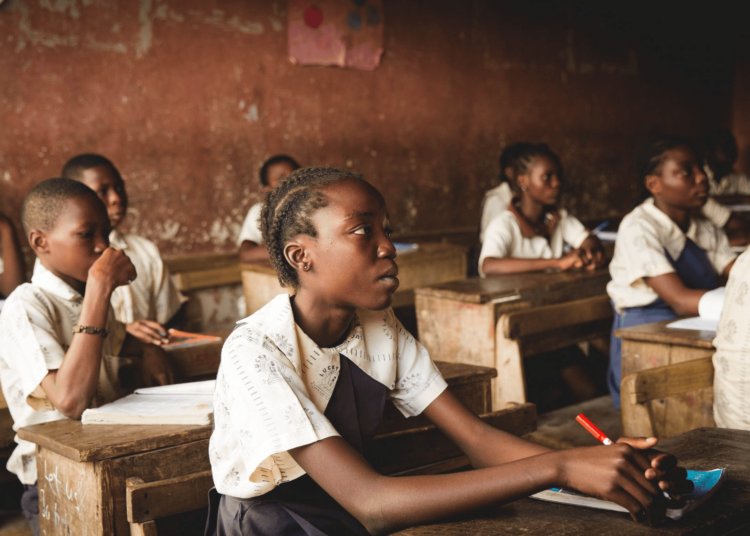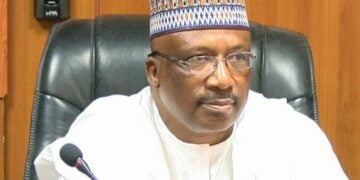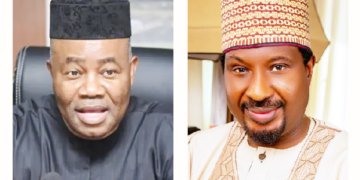Despite efforts to boost education, stakeholders in Gombe State have blamed the absence of a comprehensive education sector plan as a significant obstacle to increasing girl-child enrolment in schools.
Our correspondent’s findings indicate that less than 50 per cent of girls in the state acquire primary education through enrolment, retention, and completion of primary to junior secondary school.
The director of planning and Statistics of the state Ministry of Education, Abdulmuminu Umar Kwami, revealed that the enrolment of girls in primary schools in the state is estimated to be 44.6 per cent and 41.5 per cent in junior secondary school.
He, however, said that the figure declines to 38.5 per cent in senior secondary schools instead of increasing or maintaining the status quo.
However, education experts and stakeholders in the state ascribed the development to the lack of a gender-responsive education plan, noting that what the state had been using needed to be well-rounded.
LEADERSHIP reports that the first education sector plan was developed to be used from 2013 to 2022. The Strategic Education Sector Operational Plan 2013 — 2015 identified challenges in state education, including overcrowded classrooms, inadequately trained teachers, infrastructural decay due to blown-off roofs, inaccurate data of children in and out of school, inadequate allocation, and untimely releases of funds.
However, the two documents obtained and appraised by our correspondent did not include specific gender-responsive policies to encourage girls’ attendance in school. They failed to identify factors impeding their enrollment.
Speaking with a child rights activist in the state and founder of a non-governmental organisation known as ‘Advocacy for Children’s Rights Initiative’, Barrister Martha Daniel, she opined that the fundamental factors responsible for the prevalence of girl children out of school in the state are the preference for boys to go to school and the notion that ‘girls are meant to be housewives’.
Another factor she enumerated was poverty. She pointed out that girls in some families serve as breadwinners by hawking or engaging in farm labour to support the family, thereby hindering them from attending school. She added that lack of will to help the girl child for education is another problem.
The activist said that gender-sensitive budgeting should be addressed in the state.
According to her, the state education plan should consider economically empowering the girl child, incorporating vocational training into all secondary schools, and providing enough toilet facilities for girls and sanitary pads to encourage them to be in schools.
“To tackle this, we need to empower the girl child not just educationally but also by providing resource materials. Some girls don’t go to school because of a lack of sanitary pads. Most of our schools have nasty toilets. These are some of the factors that make girls stay out of school.
“Our girls in the north like businesses, so they hawk on the streets. Why don’t we incorporate vocational training into all our secondary schools? Let us teach these children medium-scale enterprises so a girl can produce things at home and sell them in school to her teachers and fellow students. Entrepreneurship should be introduced in schools’ curriculum since they like trading. By doing so, it will motivate them to go to schools.”
She advocated that the state’s education plan should be intentional and include a budget to tackle everything that hampers girls’ school attendance.
Also, in an interview, Abubakar Abdullahi Hussain, the state coordinator of the Civil Society Action Coalition on Education For All (CSACEFA), cited systemic issues like school facilities that are not female-friendly as a factor hindering girls’ attendance.
He added that the education sector plan should include training and retraining teachers to be up to date and inculcate current knowledge in children.
The CSACEFA coordinator also called for free education to the girl child in the state from primary to secondary school in its education plan.
Some people advocated the establishment of a force that will punish parents who refuse to allow their girls to go to schools for whatever reasons.
The Director of planning and statistics of Gombe State Ministry of Education, Abdulmuminu Umar Kwami, said the former Strategic Education Sector Plan (SESP) had been reviewed by the current administration to ensure inclusivity and address gender issues and marginalised groups, assuring that it would be submitted to the ministry shortly for implementation.
He revealed that the Gombe State Ministry of Education, under the guidance of the United Nations Children’s Fund (UNICEF) and the National Institute of Educational Planning and Administration (NIEPA), has undertaken a review of the state’s education plan that has elaborately dealt with the identified problems that were not tackled in the former plan used for many years.
“We are cautious about gender responsiveness in developing our sector plan. First, we considered our previous data where we have all the necessary information, and now we pay attention to key areas where we have challenges,” he stated.
Contrary to civil society organisations that entrust all responsibilities to the government, the director asserted that it is not the government’s responsibility to bring children to school but their parents.
“To me, I challenge the stakeholders. You can’t say that the Ministry of Education will move to Deba (local government) and start tracking the children who are being brought out to school. He said the parents are responsible for sending their kids to school.
Also commenting on the state education sector plan, Abubakar Sadiq Mohammed, head of the Education Management Information System (EMIS) of the state ministry of education, said the first time Gombe had a sector plan was in 2010.
He noted that the state’s previous plan failed to address gender issues critically, but the newly developed plan prioritises gender equality and parity, introducing innovative solutions to tackle these concerns.
The education specialist of the UNICEF Bauchi field office, Abdulrahman Ibrahim Ado, who is also in charge of Gombe State, noted that they developed two documents for Gombe State: the State Education Sector Plan (SESP) and the State Education Sector Operational Plan (SESOP).
According to him, the SESP is a 10-year plan, while SESOP) is a three-year plan, adding that the documents aim to achieve the SDGs goals to ensure education for all, irrespective of gender.
He particularly said the newly reviewed plan addresses climate change, disability inclusiveness and gender responsiveness.
Our correspondent reports that many girls in the state do not go to school, especially during rainy seasons, but troop to the streets, looking for farmers who will hire them as farm labour for token amounts of money.





